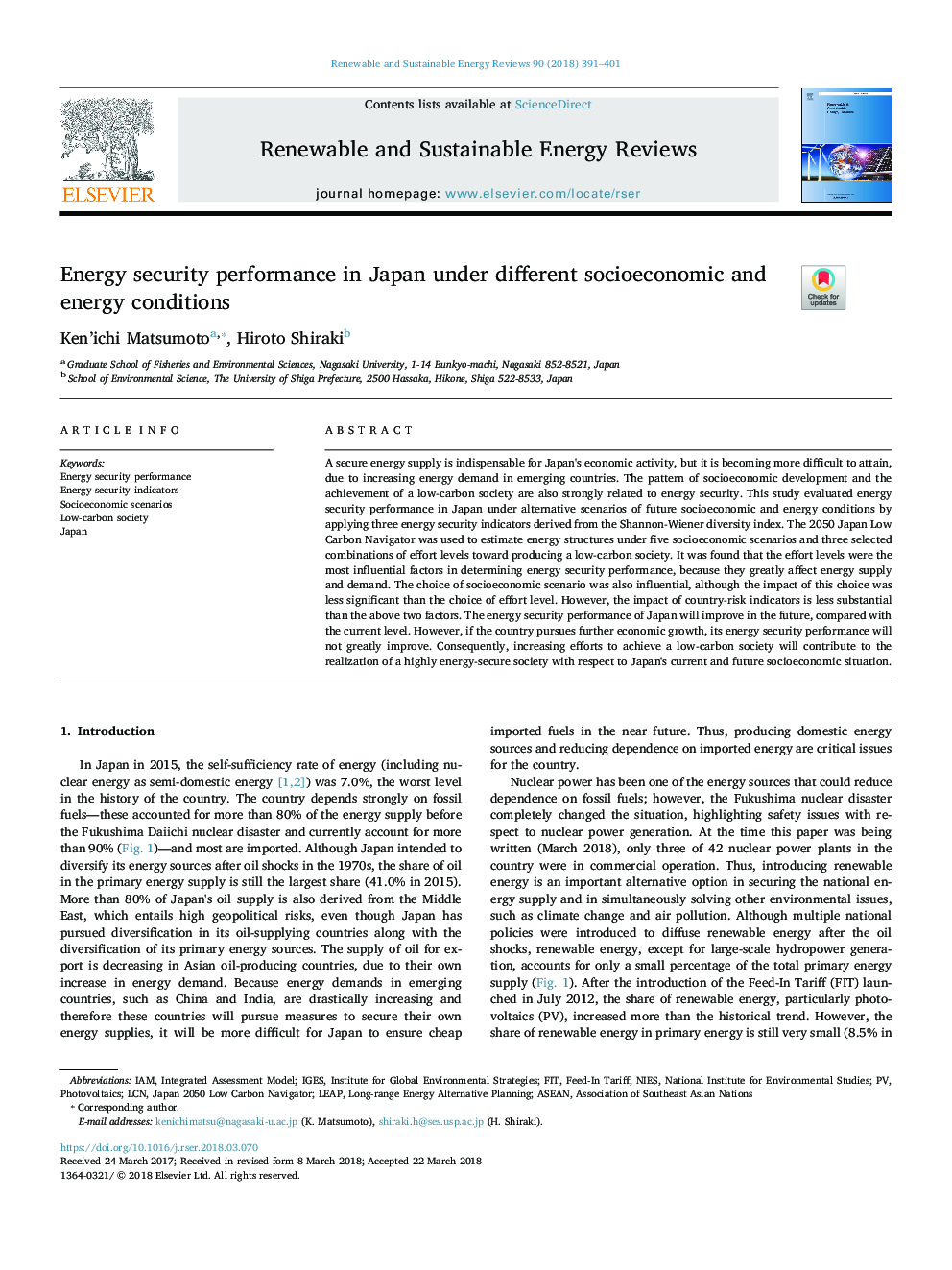| کد مقاله | کد نشریه | سال انتشار | مقاله انگلیسی | نسخه تمام متن |
|---|---|---|---|---|
| 8111296 | 1522294 | 2018 | 11 صفحه PDF | دانلود رایگان |
عنوان انگلیسی مقاله ISI
Energy security performance in Japan under different socioeconomic and energy conditions
ترجمه فارسی عنوان
عملکرد امنیتی در ژاپن تحت شرایط مختلف اقتصادی و اقتصادی
دانلود مقاله + سفارش ترجمه
دانلود مقاله ISI انگلیسی
رایگان برای ایرانیان
کلمات کلیدی
LCNLEAPIGEsSocioeconomic scenariosAssociation of Southeast Asian NationsNIEsASEAN - آسه آنFeed-in tariff - تعرفه خوراکLow-carbon society - جامعه کم کربنEnergy security indicators - شاخص های امنیتی انرژیPhotovoltaics - فتوولتاییکIntegrated assessment model - مدل ارزیابی یکپارچهIAM - من هستمFIT - مناسبJapan - ژاپن
ترجمه چکیده
عرضه انرژی امن برای فعالیت اقتصادی ژاپن ضروری است، اما با توجه به افزایش تقاضای انرژی در کشورهای در حال ظهور، به سختی می رسد. الگوی توسعه اجتماعی-اقتصادی و دستیابی به یک جامعه کم کربن نیز به شدت به امنیت انرژی مرتبط است. در این مطالعه عملکرد امنیتی انرژی در ژاپن تحت سناریوهای جایگزین شرایط اجتماعی اقتصادی و انرژی آینده با استفاده از سه شاخص امنیتی انرژی حاصل از شاخص تنوع شانون-وینر ارزیابی شد. 2050 ناوگان کم کربن ژاپن برای برآورد ساختارهای انرژی تحت پنج سناریو اجتماعی-اقتصادی و سه ترکیب انتخابی تلاش برای تولید یک جامعه کم کربن استفاده شد. مشخص شد که سطوح تلاش فاکتورهای تاثیرگذار در تعیین کارایی امنیت انرژی بوده است، زیرا آنها تا حد زیادی تأمین انرژی و تقاضا را تحت تأثیر قرار می دهند. انتخاب سناریو اجتماعی و اقتصادی نیز تأثیرگذار بود، اگر چه تأثیر این انتخاب کمتر از انتخاب سطح تلاش بود. با این حال، تاثیر شاخص های ریسک کشور کمتر از دو عامل فوق است. عملکرد امنیتی ژاپن در آینده در مقایسه با سطح فعلی بهبود خواهد یافت. با این حال، اگر کشور به دنبال رشد اقتصادی بیشتری باشد، عملکرد امنیتی آن تا حد زیادی بهبود نخواهد یافت. در نتیجه، افزایش تلاش برای دستیابی به یک جامعه با کم کربن به تحقق یک جامعه بسیار امن انرژی با توجه به وضعیت جغرافیایی و جغرافیایی جاپان کمک خواهد کرد.
موضوعات مرتبط
مهندسی و علوم پایه
مهندسی انرژی
انرژی های تجدید پذیر، توسعه پایدار و محیط زیست
چکیده انگلیسی
A secure energy supply is indispensable for Japan's economic activity, but it is becoming more difficult to attain, due to increasing energy demand in emerging countries. The pattern of socioeconomic development and the achievement of a low-carbon society are also strongly related to energy security. This study evaluated energy security performance in Japan under alternative scenarios of future socioeconomic and energy conditions by applying three energy security indicators derived from the Shannon-Wiener diversity index. The 2050 Japan Low Carbon Navigator was used to estimate energy structures under five socioeconomic scenarios and three selected combinations of effort levels toward producing a low-carbon society. It was found that the effort levels were the most influential factors in determining energy security performance, because they greatly affect energy supply and demand. The choice of socioeconomic scenario was also influential, although the impact of this choice was less significant than the choice of effort level. However, the impact of country-risk indicators is less substantial than the above two factors. The energy security performance of Japan will improve in the future, compared with the current level. However, if the country pursues further economic growth, its energy security performance will not greatly improve. Consequently, increasing efforts to achieve a low-carbon society will contribute to the realization of a highly energy-secure society with respect to Japan's current and future socioeconomic situation.
ناشر
Database: Elsevier - ScienceDirect (ساینس دایرکت)
Journal: Renewable and Sustainable Energy Reviews - Volume 90, July 2018, Pages 391-401
Journal: Renewable and Sustainable Energy Reviews - Volume 90, July 2018, Pages 391-401
نویسندگان
Ken'ichi Matsumoto, Hiroto Shiraki,
